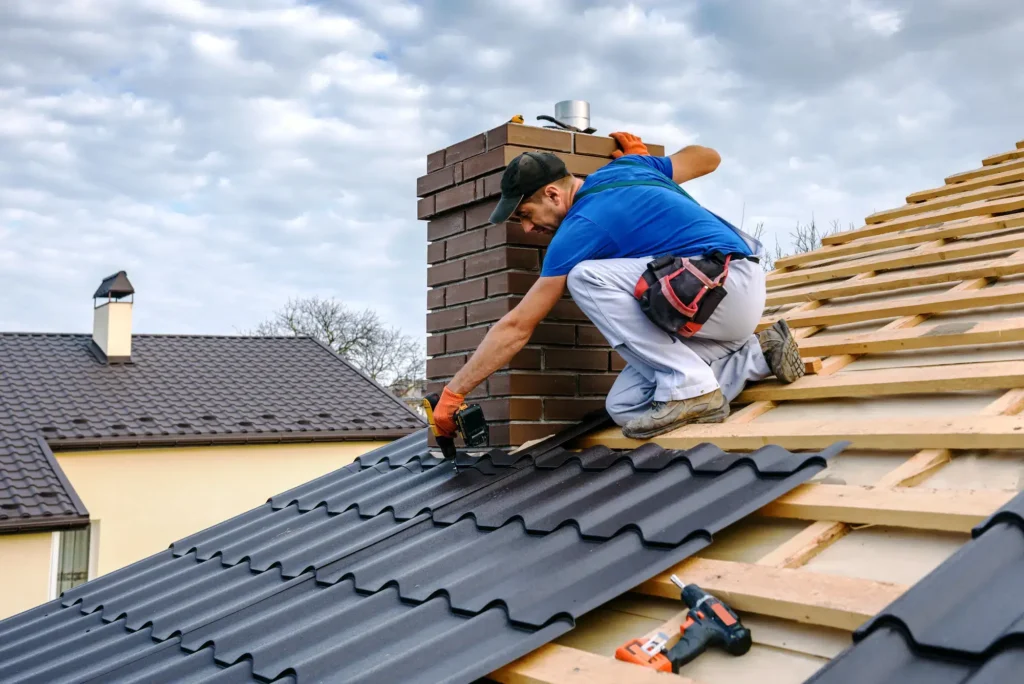Introduction
Hiring the right roofing contractor is one of the most critical decisions a homeowner can make. Your roof is your home’s first line of defense against the elements, and ensuring it’s installed or repaired by a competent professional is essential. However, with the changing trends and technologies in 2025, finding a trustworthy contractor has become more complex. This guide will walk you through the most important factors to consider when selecting a roofing contractor, ensuring you make a well-informed decision that protects your investment.
1. Understand the Role of a Roofing Contractor
Before diving into the selection process, it’s crucial to understand what a roofing contractor does. These professionals are responsible for installing, repairing, and maintaining roofs. Their expertise impacts the durability, energy efficiency, and aesthetic appeal of your roof.
When hiring, prioritize contractors who are certified and insured. Certification guarantees that they’ve undergone rigorous training, while insurance protects you in case of accidents or damages during the project. Skilled contractors ensure your roof meets safety standards, withstands extreme weather, and enhances your home’s value.
2. Assess Your Roofing Needs
Every roofing project starts with identifying your needs. Are you dealing with a leaking roof, or do you need a complete replacement? Understanding the scope of your project will guide you in choosing the right contractor.
Explore different roofing materials:
- Asphalt shingles: Cost-effective and widely used.
- Metal roofing: Durable and energy-efficient.
- Tiles: Elegant but heavier and more expensive.
- Eco-friendly options: Solar panels or green roofs for sustainability.
Recognize signs of damage, such as curling shingles, water stains, or sagging areas, to determine the urgency and type of repair needed.
3. Research and Shortlist Potential Contractors
Start by researching roofing contractors in your area. Use online platforms like Google, Angi, or the Better Business Bureau (BBB) to find highly rated professionals. Additionally, word-of-mouth recommendations from friends and family can provide reliable leads.
Why choose local contractors? They are familiar with local building codes, weather challenges, and material suppliers. Create a shortlist of potential contractors based on reviews, portfolios, and their responsiveness during your initial interactions.
4. Verify Credentials and Experience
Once you have a list of potential contractors, verify their credentials. In 2025, many states require roofing contractors to hold specific licenses or certifications. Check for accreditations from organizations like the National Roofing Contractors Association (NRCA).
Experience is another crucial factor. A contractor with years of experience is likely to have handled diverse projects and developed problem-solving skills. Request to see their portfolio or visit completed projects to assess their craftsmanship and attention to detail.
5. Evaluate Customer Reviews and Testimonials
Online reviews and testimonials are powerful tools for gauging a contractor’s reputation. Look for consistent patterns in customer feedback. Positive reviews often highlight reliability, professionalism, and quality work, while negative reviews may reveal recurring issues.
Beware of fake reviews—excessive five-star ratings without detailed descriptions or suspiciously similar language can be red flags. To gain deeper insights, consider reaching out to previous clients and asking about their experiences with the contractor.

6. Request Detailed Estimates and Compare Quotes
Transparency in pricing is vital. Request detailed written estimates from your shortlisted contractors. A good estimate should include:
- Labor costs
- Material expenses
- Project timeline
- Any additional fees or contingencies
Compare quotes not just by price but also by the quality of materials and services offered. Avoid contractors who provide vague estimates or those whose bids seem unusually low—they may cut corners to reduce costs.
7. Ensure Proper Insurance and Warranties
One of the most important aspects of hiring a roofing contractor is verifying their insurance coverage. Contractors should have both liability insurance and workers’ compensation. Liability insurance protects you if there is damage to your property during the project, while workers’ compensation ensures that you’re not held liable if a worker is injured on your property.
Additionally, inquire about warranties. Reliable contractors offer two types:
- Workmanship warranties: Cover the quality of the installation and labor.
- Manufacturer warranties: Cover defects in the roofing materials.
Ask for documentation of both insurance and warranties and review them carefully. A contractor who hesitates to provide proof is a red flag.
8. Assess Communication and Professionalism
Good communication is the cornerstone of a successful roofing project. During your interactions, pay attention to how the contractor responds to your inquiries. Are they polite, patient, and thorough in answering your questions? A contractor who fails to provide clear answers or avoids specific details may not be trustworthy.
Professionalism also matters. Consider their punctuality, presentation, and willingness to provide references or project details. Contractors who respect your time and provide detailed information upfront are more likely to deliver a positive experience.
9. Visit Ongoing or Completed Projects
Seeing a contractor’s work in person provides invaluable insight into their craftsmanship. Ask for permission to visit ongoing or recently completed projects. During your visit, observe the following:
- Quality of materials used: Are they durable and appropriate for the climate?
- Attention to detail: Look for well-aligned shingles, clean edges, and precise installations.
- Job site management: Is the site organized and safe?
These site visits help confirm whether the contractor meets your expectations and adheres to professional standards.
10. Understand the Timeline and Schedule
Time management is a crucial aspect of any roofing project. Discuss the expected timeline with your contractor before signing a contract. A clear schedule should include:
- Project start and completion dates
- Milestones for specific phases, such as material delivery or installation
Be realistic about timelines based on the project’s complexity and weather conditions. If a contractor promises unusually quick results, it may indicate they’re cutting corners. Ensure both parties agree on deadlines to avoid misunderstandings later.

11. Recognize Red Flags When Hiring
Scams and unethical practices in the roofing industry are still a concern in 2025. Protect yourself by watching for these red flags:
- No physical address or office: Fly-by-night contractors often lack a stable location.
- High-pressure sales tactics: Reliable contractors give you time to make informed decisions.
- Cash-only payments: Insist on written contracts and avoid paying in cash upfront.
If you encounter any of these warning signs, consider looking elsewhere. A legitimate contractor prioritizes transparency and customer satisfaction.
12. Prioritize Energy Efficiency and Sustainability
As environmental awareness grows, homeowners increasingly seek eco-friendly roofing solutions. Contractors in 2025 often specialize in energy-efficient and sustainable options, such as:
- Cool roofs: Reflect sunlight to reduce cooling costs.
- Solar panels: Generate renewable energy for your home.
- Recycled materials: Reduce waste without compromising quality.
Discuss these options with your contractor to determine the best solution for your home. Sustainable choices may require a higher upfront investment but offer long-term savings and environmental benefits.
13. Finalize the Contract
Before any work begins, finalize a written contract that outlines all aspects of the project. Key elements to include are:
- Scope of work
- Materials and costs
- Timeline and milestones
- Payment schedule
- Warranties and guarantees
Read the contract carefully and don’t hesitate to ask for clarifications. Ensure both parties sign it and keep a copy for your records. A well-documented agreement protects you from misunderstandings or disputes.
14. Monitor the Project Progress
Once the project begins, stay involved to ensure everything goes as planned. Regularly communicate with your contractor and visit the site if possible. Key tasks during this phase include:
- Ensuring materials match what was agreed upon
- Checking that work adheres to the timeline
- Addressing any concerns promptly
Active involvement minimizes errors and ensures the project stays on track.
15. Post-Project Care and Maintenance
After the roofing work is complete, conduct a thorough inspection with your contractor. Look for any issues or areas requiring touch-ups. Most contractors offer a post-project walkthrough to address final questions.
To maintain your roof’s longevity:
- Schedule regular inspections (at least once a year).
- Clean debris and gutters to prevent clogs.
- Address minor repairs immediately to avoid larger problems.
Taking care of your roof ensures it remains in excellent condition and provides maximum value for your investment.
Conclusion
Choosing the right roofing contractor for your home in 2025 may seem overwhelming, but by following these steps, you can make an informed decision. Prioritize professionals who are licensed, insured, and experienced. Focus on clear communication, detailed contracts, and warranties for peace of mind. Remember, investing in quality over cost not only ensures a durable roof but also enhances your home’s overall value.
FAQs
1. What qualifications should I look for in a roofing contractor?
Look for certifications, licenses, insurance, and years of experience. Reliable contractors should also provide references and detailed estimates.
2. How much should I budget for a roofing project in 2025?
The cost varies depending on the size, materials, and complexity of the project. On average, roofing replacements can range from $8,000 to $20,000 or more.
3. What are the most durable roofing materials available today?
Metal roofs, slate tiles, and high-quality asphalt shingles are among the most durable options. Each has its own pros and cons, so choose based on your needs and budget.
4. How can I verify a contractor’s insurance and licenses?
Request copies of their insurance policies and licensing documentation. Cross-check with local authorities or licensing boards for confirmation.
5. Why is hiring a local contractor beneficial?
Local contractors are familiar with regional building codes, weather conditions, and material suppliers. They’re also more accessible for post-project support.
